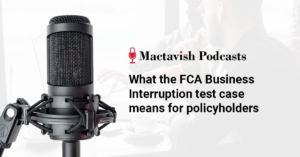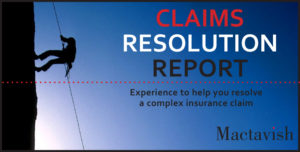
Key takeaways:
- A subset of claimants may have their chances of achieving a settlement increased by the Supreme Court case
- They are likely to have infectious disease clauses that reference the presence of a disease in the ‘vicinity’ of their business. It is debatable how those with ‘premises’ based clauses will be affected by the judgment at this time
- The Court has created greater clarity around whether national and government announcements mandated that certain businesses closed or were merely advisory, and how this relates to the wordings. However, there is still significant room for interpretation here and insurers may use this as grounds to dispute a claim
- The Court found that policyholders may have a valid BI claim even if their business was not entirely closed, but was hindered or reduced in some way as a result of Covid-19
- The judgment on ‘hybrid’ clauses was particularly complex and we recommend that policyholders with these clauses in their wordings seek professional guidance. In practice, results may vary significantly on a sector-by-sector and even business-by-business basis, meaning that claims presentation is particularly important
- The Supreme Court’s overturning of the wide area damage aspects of the Orient Express Hotels case will have a significant impact on how insurers construct wordings in the future – and may reopen old disputes.
Background:
On Friday 15th January, the Supreme Court issued its judgement in the FCA Business Interruption test case. Many commentators and media figures were quick to describe this as a considerable ‘victory’ for policyholders, with some going so far as to say it would directly impact 370,000 claims. Sadly, the picture is not quite so clear-cut.
With so much confusion as to what exactly all this means, it can be incredibly difficult to work out how the judgement might apply to your claim. In this article, we pull out some of the key points from our own analysis. We will publish further updates on our thinking as the picture continues to evolve.
What did the FCA business interruption test case set out to achieve?
When the first lockdown came into place in March last year many companies thought that they might have cover for related losses under their Business Interruption policies. This led a number of insurers – and some industry bodies – to issue broad denials suggesting that most, if not all, claims would not be valid.
The FCA sought to clear up some of these disputes by running a ‘test case’ that would assess the validity of some common policy wordings and extensions. The FCA’s intention was to bring clarity to this complex area, and to do so at speed. A number of insurers agreed to take part in the test case which was heard by the High Court and resulted in an initial judgement being handed down in September.
The High Court result was deemed to be favourable to policyholders, but the FCA and several insurers issued appeals to some of the findings which had gone against them. These appeals were ‘leapfrogged’ directly to the Supreme Court.
Does the Supreme Court judgement affect my claim?
While the FCA’s initial action was a welcome step in bringing clarity to policyholders, its scope was also quite narrow. For example, only Business Interruption policies were included, and of those, only a sub-set relating to certain types of extension. This is despite the fact that many businesses may have cover under other lines of insurance or even other parts of their Business Interruption policy. Mactavish also feels that the FCA should set out to investigate the role of insurance brokers, who play an important role in advising clients on what cover to buy and when to notify insurers of a potential claim.
Despite these limitations, the judgements of both the High Court and (even more so) the Supreme Court, were favourable to policyholders and will directly benefit a sub-set of businesses. Out of the headline figure of 370,000 firms that have impacted by the action as a whole, Mactavish estimates that somewhere between 10-30% have improved chances of achieving a settlement as a result of the case.
What did the Supreme Court determine?
To recap, the FCA action focused only on policyholders whose claims rested on three types of policy clause: infectious diseases, public authority/non-damage/denial of access, and hybrid clauses.
- Infectious disease clauses – this dispute centred on whether or not Covid-19 had to have occurred within the immediate ‘vicinity’, or on the actual premises of a business in order for a claim to be valid; and whether or not the effects of that specific incidence of Covid-19 should form the only basis on which losses could be calculated. In other words, are insurers liable for losses accruing from Covid-19 as a pandemic, or only those losses stemming from the specific localised incidence of the disease?
The Supreme Court broadly agreed with the decision of the High Court but reached it by a different set of arguments. The judges ruled that the infectious disease clauses cover only the relevant effects of COVID-19 that occur within the defined vicinity, but that the clauses trigger where there was government action taken in response to cases of the disease and that all cases of COVID-19 are of equal weight in contributing to the Government’s action. Therefore insureds need to show that there was at least one case of COVID-19 within the geographical area covered by the clause prior to the government action.
The consequence of this argument is that the Supreme Court disagreed with the High Court that two of the QBE disease wordings were not triggered, and found that all the directly tested disease wordings would trigger as long as there was a case of COVID-19 within the defined radius prior to the government action.
The judgment does not directly deal with the question of cover under infectious diseases clauses which respond to cases at the premises only, although some of the judges’ comments and reasoning could be extrapolated to these clauses as guidance. The majority of market-wide disease extension wordings are of this ‘premises’ type and thus many policyholders will not be directly aided by the judgment. It is not clear whether proof of an incident of COVID-19 on the premises is sufficient to trigger cover under these clauses. The FCA says it will produce some guidance around this issue at a later point.
- Prevention of access clauses (non-damage type) – this is a particularly complex area in which the Court’s judgements will be of mixed benefit to claimants. Two concepts are of note. Firstly, what constitutes an ‘order’ from a competent authority and to which group of affected businesses? Some of the statements from the national government were considered to be ‘advisory’ whilst others may be deemed to be ‘mandatory’. The precise legal status of the various government statements remains opaque and open to interpretation.
The second key concept revolves around whether or not ‘interruption’ meant that all business activity stopped, or whether that activity was simply hindered or disrupted in some way. With regard to all but one of the policies, the Court found that business activity did not have to stop in its entirety in order for the claim to be valid.
It remains the case that even after the Supreme Court action, the majority of the Prevention of Access clauses in their entirety were deemed not to provide cover (with the exception of Arch)
- Hybrid clauses – these wordings have multiple insuring triggers, combining elements of infectious disease cover and prevention of access cover (i.e. where such measures are taken in response to disease). They were issued by just two insurers within the scope of the Supreme Court case and unfortunately, this part of the dispute is far from easy to summarise. All the caveats which apply to the previous types of clauses also apply here, and the way in which the policies are constructed means that the sector concerned and even the specific actions of each affected business play a major role in whether or not a claim is valid. Additionally, there is a substantial degree of variation in how these clauses are constructed, meaning that it is far harder to analyse how these clauses will respond as a group.
The judgment will bring sweeping changes to way in which policies are constructed in the future (the overruling of the Orient Express Hotels case on ‘wide area damage’ alone will have implications far beyond Covid-19 claims.)
However, for many policyholders the judgment does not provide straightforward means for judging Covid-19 Business Interruption claims on a broad, widespread basis.
The truth is that each claimant will have to present their specific circumstances to their insurer and work out how all of this might apply to them. While the case has cleared up some of the bases for dispute, it has not cleared up all of them, and not in such a way as to easily determine whether or not your specific claim is now valid.
What can you do next?
In the first instance, if you believe you have a valid claim and have not yet notified your insurer, you should do so immediately. In a note to insurers on 22nd January the FCA made clear that the time period over which the case has taken place should not be included in any time limits on notification listed in the relevant policy. Failure to notify within a time period can lead to an invalidated or disputed claim.
Secondly, you should seek professional advice from an established company such as Mactavish. Our experts have been supporting a range of clients – from FTSE 100s to SMEs – on these issues since March and are well-placed to both assess the validity of your claim and to progress it with your insurer. Our background in policy analysis, legal reform, drafting and claims mean that we see every aspect of the commercial insurance market.
It is also worth remembering here, that even though the scope of the FCA test case was limited to Business Interruption you may have valid cover in another policy or a different clause than those included in the case.
If you have any concerns about your claim or would like to discuss an aspect of the case we would be delighted to help.
Heidi Carslaw
heidicarslaw@mactavishgroup.com
T: +44 (0) 207 046 7974








